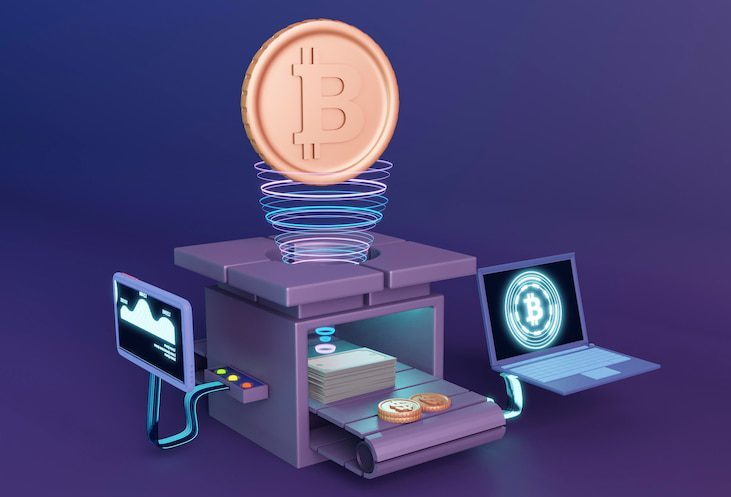Bitcoin, the world’s first decentralized cryptocurrency, has grown in popularity. The method of Bitcoin mining is becoming more popular as the demand for Bitcoin grows. Bitcoin mining is what allows Bitcoins to flow in the market.
Bitcoin mining, a subset of the cryptocurrency mining ecosystem, is entirely concerned with the verification and security of Bitcoin transactions. The process of validating and recording transactions on the Bitcoin network. The primary goal of Bitcoin mining is to validate transactions to avoid fraud and to add new blocks to the blockchain, which results in the decentralized generation of new Bitcoins. The value of Bitcoin has risen over time because of future promises made to Bitcoin miners, who often verify transactions.
Let’s understand some pros and cons of Bitcoin mining to figure out the prospects in the crypto sector.
Some Benefits of Bitcoin Mining
1. Energy-Intensive Nature
Bitcoin’s energy-intensive nature has drawn attention to the need for green energy sources. Miners looking to maximize earnings have expressed an interest in using green energy options such as solar and wind power. This helps to expand renewable energy infrastructure while also reducing environmental risks linked to traditional energy sources.
2. Technological Advancement
Bitcoin mining has led to technological advancements in the hardware industry. Companies spend on research and development to build better ASICs as the demand for more efficient mining equipment grows. This technical advancement has the potential to aid other businesses that demand high-performance computing.
3. Profitable
Bitcoin mining can be profitable for people who have access to the required hardware and low-cost electricity. Miners are paid for uploading new transactions to the blockchain and creating new Bitcoins. Mining could be done on a conventional computer in the beginning, but as the network grew, specialized hardware known as Application-Specific Integrated Circuits became necessary. Miners who mine efficiently and at the right time may earn an enormous amount of Bitcoin.
4. An Alternative Source of Income
Bitcoin mining provides an alternative source of income for individuals or enterprises wishing to expand their financial assets. They can potentially gain earnings from the appreciation of Bitcoin as well as mining rewards by engaging in mining activities
5. Security and Decentralization
Bitcoin mining is crucial to the network’s security and decentralization. Miners validate transactions and guarantee that they follow the rules of the network. Because this mechanism avoids fraud and double-spending, Bitcoin is a safe digital currency. Furthermore, because mining is decentralized, no single entity has authority over the network, lowering the danger of censorship or exploitation.
Moreover, no one can access your funds unless they obtain the private key to your crypto wallet. If you forget or lose your key, you will be unable to get your funds back. Also, the blockchain system and the distributed network of computers that verify the transactions protect the transactions. It is safer for investors to retain crypto assets in their own wallets. The use of public and private keys, proof of labor or proof of stake, and other types of incentive systems protect the transactions.
The Drawbacks of Bitcoin Mining
- Volatility and Market Risk: The price volatility of Bitcoin creates a danger to miners. Mining profitability is affected not only by the amount of Bitcoin mined but also by its market value. Price fluctuations in Bitcoin can have an impact on mining profitability, potentially turning some operations unprofitable, particularly during bad markets. Miners must carefully control their operational costs and foresee market volatility.
- High Power Consumption: Bitcoin mining consumes a lot of energy, due to the computer capacity required to solve complicated mathematical puzzles. As a result, mining activities use a lot of electricity, which contributes to environmental issues and carbon emissions. Critics believe that mining’s energy usage is unsustainable and contributes to climate change.
- Cost of Mining Equipment and Maintenance: Mining Bitcoin requires the use of specialized hardware, such as ASICs, which can be costly to buy and operate. Furthermore, as network difficulty rises, miners must continually improve their equipment to remain competitive. For ambitious miners, the initial investment and continuous maintenance fees can be too costly.
- Concerns about Centralization: Although Bitcoin is meant to be decentralized, mining has grown increasingly concentrated in the hands of a few significant players. Large-scale mining operations have more resources, allowing them to control the network and potentially the consensus process. This concentration of power raises concerns about the centralization of Bitcoin mining as well as the network’s security.
- Long-Term Dependability: As the supply of currencies increases, mining incentives drop due to a mechanism known as halving. Mining may become less profitable over time as block rewards decline and difficulty levels rise. Miners will have to rely more on transaction fees to continue their operations, which may present certain difficulties in terms of profitability.
The Bottom Line
The world of Bitcoin mining is a two-sided environment defined by distinct benefits and drawbacks. On the one hand, the decentralized nature of Bitcoin mining encourages financial inclusion by allowing you to participate in a global digital market without any mediator. This technology has the ability to transform the financial sector by enabling borderless transactions and the creation of wealth. Furthermore, the underlying blockchain technology ensures security and transparency, raising participants’ trust.
Yet, these pros come with certain cons. Because enormous processing power is necessary to validate transactions and operate the network, the energy-intensive aspect of Bitcoin mining raises environmental concerns. Moreover, as larger players gather more resources, the intense battle for mining rewards might lead to centralization, thus weakening the decentralized concept of cryptocurrencies.


